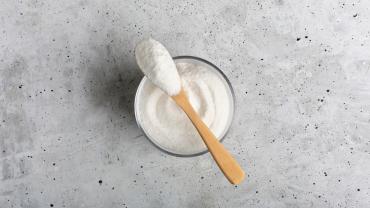
Collagen protein accounts for as much as 30% of the body’s total protein and is the primary structural protein of the body’s connective tissue. It plays a crucial role in supporting organ development, healing wounds, promoting healthy skin appearance and elasticity, and maintaining the health and function of tendons, nails, joints, and bones. Collagen may also promote the production of skeletal muscle.
The potential ability to promote muscle synthesis may be clinically relevant to two large population groups: aging individuals and athletes. The natural aging process is associated with decreased muscle mass, strength, and functionality; supporting muscle mass is vital for healthy aging. On the other hand, many athletes desire increased muscle mass and strength after resistance and strength training; skeletal muscle hypertrophy requires adequate protein intake for this process to occur.
Kitakaze and colleagues demonstrate that the dipeptides and tripeptides in collagen, such as hydroxypropyl-glycine, may activate the mammalian target of rapamycin (mTOR) pathway, which plays a critical role in muscle protein synthesis. Research suggests collagen peptides may also support healthy muscle recovery and help mitigate muscle soreness post-exercise. Although the exact mechanism by which collagen may promote muscle health and function is still being investigated, a randomized-controlled double-blind study further suggests that collagen peptides may upregulate the gene expressions involved in skeletal muscle signal transduction.
Several randomized controlled trials (RCTs) have demonstrated that collagen peptide supplements may promote the clinical benefits of resistance training exercises in promoting muscle synthesis. In these RCTs, each experimental group combined collagen peptide supplements with resistance training exercises for at least 12 weeks.
For example, in one RCT (n = 25), recreationally active young men who combined collagen peptide supplements with resistance training exercises experienced a more significant increase in body mass, fat-free mass, and muscle strength than those who performed resistance training exercises alone. Similarly, young, healthy men who received collagen peptides supplementation with resistance training (n = 19) showed increased quadricep size and total muscle volume compared to those who received a placebo (n = 20).
In 77 premenopausal women (aged 18 to 50 years old), the experimental group that received collagen peptides and followed a resistance training program displayed a significant increase in hand-grip strength and fat-free mass compared to the placebo. The researchers posit that the improvements were due to increased collagen content in the intramuscular connective tissue and mTOR stimulation.
For middle-aged, untrained men (n = 97) and elderly men with sarcopenia (n = 53), the men receiving collagen peptide supplements combined with resistance training exercise had a greater increase in fat-free mass, muscle strength, and a loss of fat mass compared to a placebo. One experimental group had more pronounced effects than a group receiving whey protein.
Collagen peptides have a unique amino acid composition that may support muscle production. While further research is needed, clinical studies suggest collagen peptides may promote overall muscle health, particularly when combined with resistance training exercises.
By Danielle Moyer, MS, CNS, LDN